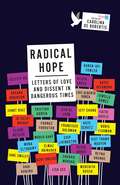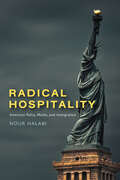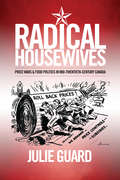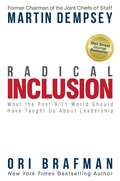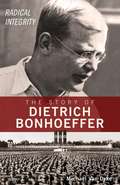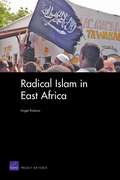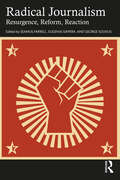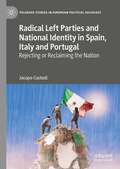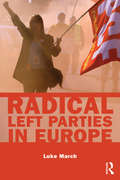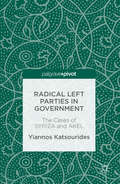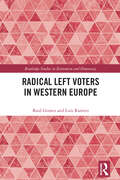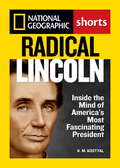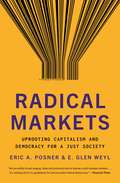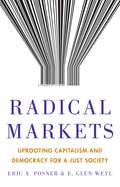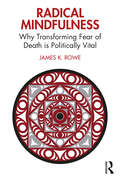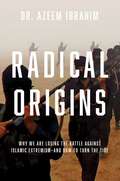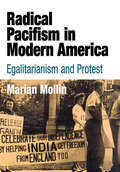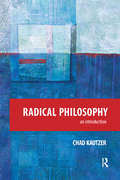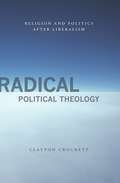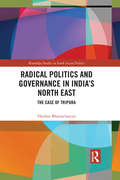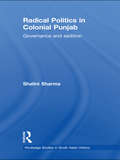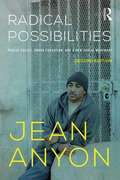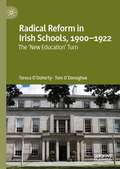- Table View
- List View
Radical Hope: Letters of Love and Dissent in Dangerous Times
by Carolina De RobertisRadical Hope is a collection of letters—to ancestors, to children five generations from now, to strangers in grocery lines, to any and all who feel weary and discouraged—written by award-winning novelists, poets, political thinkers, and activists. Provocative and inspiring, Radical Hope offers readers a kaleidoscopic view of the love and courage needed to navigate this time of upheaval, uncertainty, and fear, in view of the recent US presidential election.Including letters by Junot Díaz, Alicia Garza, Roxana Robinson, Lisa See, Jewelle Gomez, Hari Kunzru, Faith Adiele, Parnaz Foroutan, Chip Livingston, Mohja Kahf, Achy Obejas, Viet Thanh Nguyen, Cherríe Moraga, Kate Schatz, Boris Fishman, Karen Joy Fowler, Elmaz Abinader, Aya de León, Jane Smiley, Luis Alberto Urrea, Mona Eltahawy, Jeff Chang, Claire Messud, Meredith Russo, Reyna Grande, Katie Kitamura, iO Tillett Wright, Francisco Goldman, Celeste Ng, Peter Orner, and Cristina García.
Radical Hospitality: American Policy, Media, and Immigration
by Nour HalabiRadical Hospitality: American Policy, Media, and Immigration re-imagines the ethical relationship of host societies towards newcomers by applying the concept of hospitality to two specific realms that impact the lives of immigrants in the United States: policy and media. The book calls attention to the moral responsibility of the host in welcoming a stranger. It sets the stage for the analysis with a historical background of the first host-guest diads of American hospitality, arguing that the early history of American hospitality was marked by the degeneration of the host-guest relationship into one of host-hostage, normalizing a racial discrimination that continues to plague immigration hospitality to this day. Author Nour Halabi presents a historical policy and media discourse analysis of immigration regulation and media coverage during three periods of US history: the 1880s and the Chinese Exclusion Act, the 1920s and the National Origins Act and the 2000s and the Muslim travel ban. In so doing, it demonstrates how U.S. immigration hospitality, from its peaks in the post-Independence period to its nadir in the Muslim travel ban, has fallen short of true hospitality in spite of the nation’s oft-touted identity as a “nation of immigrants.” At the same time, the book calls attention to how a discourse of hospitality, although fraught, may allow a radical reimagining of belonging and authority that unsettles settler-colonial assumptions of belonging and welcome a restorative outlook to immigration policy and its media coverage in society.
Radical Housewives: Price Wars and Food Politics in Mid-Twentieth-Century Canada (Studies in Gender and History)
by Julie GuardRadical Housewives is a history of Canada’s Housewives Consumers Association. This association was a community-based women’s organization with ties to the communist and social democratic left that, from 1937 until the early 1950s, led a broadly based popular movement for state control of prices and made other far-reaching demands on the state. As radical consumer activists, the Housewives engaged in gender-transgressive political activism that challenged the government to protect consumers’ interests rather than just those of business while popularizing socialist solutions to the economic crises of the Great Depression and the immediate postwar years. Julie Guard's exhaustive research, including archival research and interviews with twelve former Housewives, recovers a history of women’s social justice activism in an era often considered dormant and adds a Canadian dimension to the history of politicized consumerism and of politicized materialism. Radical Housewives reinterprets the view of postwar Canada as economically prosperous and reveals the left’s role in the origins of the food security movement.
Radical Inclusion: What the Post-9/11 World Should Have Taught Us About Leadership
by Ori Brafman Martin DempseyRadical Inclusion: What the Post-9/11 World Should Have Taught Us About Leadership examines today's leadership landscape and describes the change it demands of leaders. Dempsey and Brafman persuasively explain that today's leaders are in competition for the trust and confidence of those they lead more than ever before. They assert that the nature of power is changing and should not be measured by degree of control alone. They offer principles for adaptation and bring them to life with examples from business, academia, government, and the military. In building their argument, Dempsey and Brafman introduce several concepts that illuminate both the vulnerability and the opportunity in leading today: Radical Inclusion. Fear of losing control in our fast-paced, complex, highly scrutinized environment is pushing us toward exclusion―exactly the wrong direction. Leaders should instead develop an instinct for inclusion. The word "radical" emphasizes the urgency of doing so. The Era of the Digital Echo. The speed and accessibility of information create "digital echoes" that make facts vulnerable, eroding the trust between leader and follower. Relinquishing Control to Preserve Power. Power and control once went hand in hand, but no longer. In today's environment, control is seductive but unlikely to produce optimum, affordable, sustainable solutions. Leaders must relinquish and share control to build and preserve power. The principles discussed in Radical Inclusion are memorable and the book is full of engaging stories. From a young vegan's confrontation with opponents in Berkeley to a young lieutenant's surprising visitor during the Cold War, from a reflection on the significance of Burning Man to a discussion of challenges faced in the Situation Room, Radical Inclusion will provide you with leadership tools to address real leadership challenges.
Radical Integrity: The Story of Dietrich Bonhoeffer
by Michael Van DykeYou'll be inspired by this story of a German pastor and theologian who gave his life to oppose Adolf Hitler and his Nazi regime. Born into a prominent German family, Dietrich Bonhoeffer died in a Nazi prison camp, hanged for his plot against the man who'd plunged the world into war. Find out what made Dietrich Bonhoeffer the man he was--compassionate minister, brilliant thinker, opponent of the heresies of Nazism and Aryan superiority. This easy-to-read biography details both Bonhoeffer's life and his powerful theology--of "cheap" versus "costly" grace.
Radical Islam and International Security: Challenges and Responses
by Efraim Inbar Hillel FrischRadical Islam poses a political challenge in the modern world which is like that of no other radical religious movement. Ideologically, it is perceived by Western policy makers as threatening the liberal-democratic ideology by which most states in the West abide and which most other states rhetorically espouse. This book serves as a welcome addition to the intellectual and policy debate on the nature of the radical Islam phenomenon and how to respond to it. The collection is divided into three parts: the first part seeks to understand the Islamic challenge in broad comparative and historical terms, while the second part deals with specific regional case studies, which seek to identify patterns of uniformity and variation in radical Islam across a wide swath of terrain. The third part is policy-oriented, suggesting possible responses to the Islamic challenge. The contributors include distinguished researchers from Europe, North America and the Middle East. This book will be of much interest to students of Islamism, political violence, international security and Middle Eastern politics.
Radical Islam in East Africa
by Angel RabasaAmerican geopolitical interests and the potential threats to those interests are both on the rise in East Africa. The author places the spread of militant Islamism and the development of radical Islamist networks in East Africa in the broader context of the social, economic, and political factors that have shaped the region's security environment.
Radical Journalism: Resurgence, Reform, Reaction
by Eugenia Siapera George Souvlis Seamus FarrellThis edited volume offers a state-of-the-art synthesis of the historical role of radical journalism, its present iterations, and plans for the future of a journalism that is committed to liberatory movements and politics. At a time of profound crisis and stagnation for mainstream journalism, radical journalism seems to be riding a wave. New outlets, including those – like Jacobin – with a global reach, have sprung up, presenting a new generation of unapologetically progressive publications with an emancipatory agenda. Understanding the role and place of radical journalism becomes even more urgent given the current political climate in a (post) pandemic world with heightened inequalities and intensified pauperisation. Drawing on contributions from leading academics, this collection considers: • How new outlets fit in the genealogy of (radical) journalism and what their flourishing can tell us about the present and future of emancipatory politics and the role of the radical journalist; • What these new forms and publications mean for mainstream journalism and its persisting problems of financial sustainability and professional journalistic labour; • Important challenges presented by, for example, the resurgence of fascism, authoritarianism and the mainstreaming of the far right; • Essential questions of what radical journalism looks like today, what forms it takes or should take, and what its future might be. Radical Journalism is recommended reading for advanced students and journalists working at the intersection of journalism, politics, and sociology.
Radical Left Parties and National Identity in Spain, Italy and Portugal: Rejecting or Reclaiming the Nation (Palgrave Studies in European Political Sociology)
by Jacopo CustodiThis book investigates how the radical left navigates the terrain of nationalism. Traversing Spain, Italy and Portugal, this in-depth study examines how radical left parties either embrace, rebuff or reshape nationalistic sentiments. From Spain’s Podemos grappling with Franco’s legacy, Italy’s radical left switching from anti-fascist patriotism to cosmopolitanism, to Portugal’s revolutionary echoes in left-leaning banal nationalism, the book offers comprehensive insight into the often-overlooked relationship between radical left politics and national identity. Through discourse analysis, interviews and participant observation, it delves into the reasons behind certain political positions and how they manifest discursively. A must-read for those eager to decipher the crossroads of national identity and left-wing politics in contemporary Europe.
Radical Left Parties in Europe (Extremism and Democracy)
by Luke MarchWhat has happened to the European radical left after the collapse of the USSR? How has it reacted, reformed, even revived? This new volume is one of the first to provide an overview of the main developments in contemporary European radical left parties (those defining themselves as to the left of, and not merely on the left of social democracy), which are now an increasingly visible phenomenon in European party politics. Unlike many of the existing studies it focuses on communist and non-communist parties, addresses their non-parliamentary and international activity, and takes a pan-European perspective, focusing on both Eastern and Western Europe. March focuses on key contemporary left parties, the nature of their radicalism and their ideological and strategic positions, and overall, addresses their current dynamics and immediate electoral prospects. The book argues that radical left parties are still afflicted by existential crises about the nature of ‘socialism’, and the future of communist parties in particular is under threat. The most successful left parties are no longer extremist, but present themselves as defending values and policies that social democrats have allegedly abandoned, focus on pragmatism rather than ideology and increasingly orientate themselves towards government. Providing a significant contribution to existing literature in the field, this book will be of interest to students and scholars of comparative politics, political parties and radical politics.
Radical Left Parties in Government
by Yiannos KatsouridesThis book provides a comparative analysis of how two radical left parties achieved government participation and their subsequent political experiences. In the face of the most severe and most prolonged crisis in the history of capitalism, it would be expected for radical left parties to seize the opportunity to promote their political agenda. Although reality has often confounded prognosis, two particular radical left parties - the Greek SYRIZA and the Cypriot AKEL - were elected to the highest government office. The author uses these two examples to engage with the broader question of what to expect when left-wing radicals achieve governance. This question is now of particular importance given the emergence of radical leftists in other parts of Europe, including Corbyn in the UK and Podemos in Spain.
Radical Left Voters in Western Europe (Routledge Studies in Extremism and Democracy)
by Raul Gomez Luis RamiroRadical Left Voters in Western Europe explores who votes for Radical Left Parties in contemporary Western Europe, and why. Once considered a relic of the past which was doomed to disappear in affluent societies, Radical Left Parties were able to survive unprecedented electoral crises in the 1980s and 1990s to become a stable and significant feature of contemporary West European politics. Despite this, our knowledge of the electorate of contemporary Radical Left parties is extremely limited. To fill this gap, this book analyzes the radical left electorate in 17 West European countries (Belgium, Cyprus, Denmark, Finland, France, Greece, Germany, Iceland, Ireland, Italy, Luxembourg, the Netherlands, Norway, Portugal, Spain, Sweden, and Switzerland) for a period of 18 years (2000–2018). The research combines data from multiple sources (surveys, country-level data, and party-level data) to show how, amid social and political change, Radical Left Parties have been able to maintain a relatively sizeable and clearly identifiable electorate with fairly similar socio-demographic and attitudinal features. Moreover, the book argues that in order to explain electoral support for Radical Left Parties it is important to consider not only voter characteristics, but also the characteristics of the parties themselves and of the political and economic context in which they compete for votes. This book will be of interest to scholars of comparative politics, political sociology, electoral behaviour, and political parties.
Radical Lincoln: Inside the Mind of America's Most Fascinating President
by K. M. KostyalHe has more books written about him than any other President of the United States but what do we really know about the man himself? There are a handful of facts: he was from the frontier, was raised in a poor farmer family, had a passion for learning, was quiet, and a skeptic. Millions of words have been spilled over the details of his life. But who was the real Lincoln? In this daring ebook short, K. M. Kostyal uses the facts of Lincoln's early life to build a psychological profile of the man who would change the course of history. She examines his early life to understand how this bright frontier lawyer would come to lead a nation, noting especially the dramatic influence of Lincoln's hard-driving father and his brilliant, political, and often misunderstood wife Mary in challenging him to reach for the highest office in the United States. She further looks at just how such a brilliant political mind was able to maintain his connection to simple country folk, and how that connection has amplified over the decades so that the 'cult of Lincoln' that only grows larger with each passing year. Bringing fresh insights and a brilliant grasp of history to one of history's most enigmatic characters, Kostyal paints a compulsively readable portrait that will be a popular read for years to come.
Radical Marble: Architectural Innovation from Antiquity to the Present (Routledge Research in Art History)
by J. Nicholas Napoli William TronzoMarble is one of the great veins through the architectural tradition and fundamental building block of the Mediterranean world, from the Parthenon of mid-fifth century Athens, which was constructed of pentelic marble, to Justinian’s Hagia Sophia in Constantinople and the Renaissance and Baroque basilica of St. Peter’s in the Vatican. Scholarship has done much in recent years to reveal the ways and means of marble. The use of colored marbles in Roman imperial architecture has recently been the subject of a major exhibition and the medieval traditions of marble working have been studied in the context of family genealogies and social networks. In addition, architectural historians have revealed the meanings evoked by marble revetted and paved surfaces, from Heavenly Jerusalem to frozen water. The present volume builds upon the body of recent and emerging research - from antiquity to the present day - to embrace a global focus and address the more unusual (or at least unexpected) uses, meanings, and aesthetic appeal of marble. It presents instances where the use of marble has revolutionized architectural practice, suggested new meaning for the built environment, or defined a new aesthetic - moments where this well-known material has been put to radical use.
Radical Markets: Uprooting Capitalism and Democracy for a Just Society
by Eric A. Posner E. Glen WeylRevolutionary ideas on how to use markets to achieve fairness and prosperity for allMany blame today's economic inequality, stagnation, and political instability on the free market. The solution is to rein in the market, right? Radical Markets turns this thinking on its head. With a new foreword by Ethereum creator Vitalik Buterin and virtual reality pioneer Jaron Lanier as well as a new afterword by Eric Posner and Glen Weyl, this provocative book reveals bold new ways to organize markets for the good of everyone. It shows how the emancipatory force of genuinely open, free, and competitive markets can reawaken the dormant nineteenth-century spirit of liberal reform and lead to greater equality, prosperity, and cooperation.Only by radically expanding the scope of markets can we reduce inequality, restore robust economic growth, and resolve political conflicts. But to do that, we must replace our most sacred institutions with truly free and open competition—Radical Markets shows how.
Radical Markets: Uprooting Capitalism and Democracy for a Just Society
by Eric Posner E. WeylRevolutionary ideas on how to use markets to bring about fairness and prosperity for allMany blame today's economic inequality, stagnation, and political instability on the free market. The solution is to rein in the market, right? Radical Markets turns this thinking--and pretty much all conventional thinking about markets, both for and against—on its head. The book reveals bold new ways to organize markets for the good of everyone. It shows how the emancipatory force of genuinely open, free, and competitive markets can reawaken the dormant nineteenth-century spirit of liberal reform and lead to greater equality, prosperity, and cooperation.Eric Posner and Glen Weyl demonstrate why private property is inherently monopolistic, and how we would all be better off if private ownership were converted into a public auction for public benefit. They show how the principle of one person, one vote inhibits democracy, suggesting instead an ingenious way for voters to effectively influence the issues that matter most to them. They argue that every citizen of a host country should benefit from immigration—not just migrants and their capitalist employers. They propose leveraging antitrust laws to liberate markets from the grip of institutional investors and creating a data labor movement to force digital monopolies to compensate people for their electronic data.Only by radically expanding the scope of markets can we reduce inequality, restore robust economic growth, and resolve political conflicts. But to do that, we must replace our most sacred institutions with truly free and open competition—Radical Markets shows how.
Radical Mindfulness: Why Transforming Fear of Death is Politically Vital
by James K. RoweRadical Mindfulness examines the root causes of injustice, asking why inequalities along the lines of race, class, gender, and species continue to exist. Specifically, James K. Rowe examines fear of death as a root cause of systemic inequalities and proposes a more embodied approach to social change as a solution. Collecting insights from powerful thinkers across multiple traditions—including Black radicals, Indigenous resurgence theorists, terror management theorists, and Buddhist feminists— Rowe argues for the political importance of seemingly apolitical practices such as meditation and ritual. On their own, these strategies are not enough, but integrated into social movements that are combating structural injustices, mind–body practices can begin transforming the embodied fears that feed endless fuel to supremacist ideologies and yet are not targeted by most political actors. Radical Mindfulness is for academics, activists, and individuals who want to overcome supremacy of all kinds but are struggling to understand and develop methods for attacking it at the roots.
Radical Origins: Why We Are Losing The Battle Against Islamic Terrorism--and How To Turn The Tide
by Azeem IbrahimPiercing and hard-hitting, an international expert pin-points the menacing rise of a radical ideology that is fueling ISIS and terror cells world-wide. More than thirteen years ago after the "War on Terror" was declared, many in the West now feel less secure than ever before. Many security experts believe global Jihad is on the rise throughout the West, and yet these same experts do not know how to stop the rising tide. Military action abroad and police action at home have only attended to the symptoms of terrorism, not the cause. The root, according to Dr. Ibrahim, is actually the extreme ideology of Wahhabism—the puritanical, reactionary, isolationist, xenophobic, and bigoted sect of Sunni Islam that has been the ideological bedrock of the state of Saudi Arabia since its original rise in the 18th Century. Foreign policy, socio-economic factors, alienation, and identity are often invoked in explaining the rise in radicalization, and while they do have a role to play, these are secondary factors. The primary cause is ideology, and Dr. Ibrahim places the origins of this radical extremism in historic context in a cogent manner, while also articulating specific policy goals and social action points going forward. Much of it hinges on altering decades of geopolitics regarding Saudi Arabia. In his groundbreaking Radical Origins, Dr. Ibrahim will provide an accessible primer on radicalism, an understanding of jihadist history, and a way forward, debunking misconceptions about Islam and this jihadist offshoot along the way. This remarkable work culminates in a powerful body of evidence about how to contain, reduce, and stop the spread of radicalization once and for all.
Radical Pacifism in Modern America
by Marian MollinRadical Pacifism in Modern America traces cycles of success and decline in the radical wing of the American peace movement, an egalitarian strain of pacifism that stood at the vanguard of antimilitarist organizing and American radical dissent from 1940 to 1970. Using traditional archival material and oral history sources, Marian Mollin examines how gender and race shaped and limited the political efforts of radical pacifist women and men, highlighting how activists linked pacifism to militant masculinity and privileged the priorities of its predominantly white members. In spite of the invisibility that this framework imposed on activist women, the history of this movement belies accounts that relegate women to the margins of American radicalism and mixed-sex political efforts. Motivated by a strong egalitarianism, radical pacifist women rejected separatist organizing strategies and, instead, worked alongside men at the front lines of the struggle to construct a new paradigm of social and political change. Their compelling examples of female militancy and leadership challenge the essentialist association of female pacifism with motherhood and expand the definition of political action to include women's political work in both the public and private spheres. Focusing on the vexed alliance between white peace activists and black civil rights workers, Mollin similarly details the difficulties that arose at the points where their movements overlapped and challenges the seemingly natural association between peace and civil rights.Emphasizing the actions undertaken by militant activists, Radical Pacifism in Modern America illuminates the complex relationship between gender, race, activism, and political culture, identifying critical factors that simultaneously hindered and facilitated grassroots efforts at social and political change.
Radical Philosophy: An Introduction
by Chad KautzerIn this accessible introduction for students, teachers, and activists, Chad Kautzer guides readers through the dynamic field of radical philosophy. Kautzer s innovative approach is to organize the analysis of radical philosophical projects from Marxism, feminism, and queer theory to radical environmental, race, and political theory around their defining methodological commitments and emancipatory goals. Beginning with a discussion of the historical, dialectical, and reflexive forms of critique these projects employ, Radical Philosophy reveals the internal structure and overlapping similarities of particular philosophical projects discussed in subsequent chapters. The result is a coherent and systematic introduction for beginners and specialists alike."
Radical Political Theology: Religion and Politics After Liberalism (Insurrections: Critical Studies in Religion, Politics, and Culture)
by Clayton CrockettIn the 1960s, the strict opposition between the religious and the secular began to break down, blurring the distinction between political philosophy and political theology. This collapse contributed to the decline of modern liberalism, which supported a neutral, value-free space for capitalism. It also deeply unsettled political, religious, and philosophical realms, forced to confront the conceptual stakes of a return to religion.Gamely intervening in a contest that defies simple resolutions, Clayton Crockett conceives of the postmodern convergence of the secular and the religious as a basis for emancipatory political thought. Engaging themes of sovereignty, democracy, potentiality, law, and event from a religious and political point of view, Crockett articulates a theological vision that responds to our contemporary world and its theo-political realities. Specifically, he claims we should think about God and the state in terms of potentiality rather than sovereign power. Deploying new concepts, such as Slavoj i ek's idea of parallax and Catherine Malabou's notion of plasticity, his argument engages with debates over the nature and status of religion, ideology, and messianism. Tangling with the work of Derrida, Deleuze, Spinoza, Antonio Negri, Giorgio Agamben, Alain Badiou, John D. Caputo, and Catherine Keller, Crockett concludes with a reconsideration of democracy as a form of political thought and religious practice, underscoring its ties to modern liberal capitalism while also envisioning a more authentic democracy unconstrained by those ties.
Radical Politics and Governance in India's North East: The Case of Tripura (Routledge Studies in South Asian Politics)
by Harihar BhattacharyyaTripura in India’s Northeast remains the only region in the world which has sustained a strong left radical political tradition for more than a century, in a context not usually congenial for left politics. Tripura is one of the 29 States in India which has returned the Communist Party of India (Marxist) led Left Front repeatedly to power. By contrast, radical ethnic politics dot the political scenario in the rest of the region. This book examines the roots, nature, governmental performance, and theoretical and policy implications of left radicalism in Tripura. The case of Tripura is placed in comparison with her neighbours in the region, and in some cases with India’s advanced States in governance matters. Based on original archival and the very recent empirical and documentary sources on the subject, the author shows that the Left in Tripura is well-entrenched, and that it has sustained itself compared to other parts of India, despite deeply rooted ethnic tensions between the aboriginal peoples (tribes) and immigrant Bengalis. The book explains how the Left sustains itself in the social and economic contexts of persistent ethnic conflicts, which are, rarely, if ever, punctuated by incipient class conflicts in a predominantly rural society in Tripura. It argues that shorn of the Indian Marxism’s ‘theoretical’ shibboleths, the Left in Tripura, which is part of the Indian Left, has learned to accommodate non-class tribal ethnicity within their own discourse and practices of government. This study demolishes the so-called ‘durable disorder’ hypothesis in the existing knowledge on India’s Northeast. A useful contribution to the study of radical left politics in India in general and state politics in particular, this book will be of interest to researchers of modern Indian history, India’s Northeast, and South Asian Politics.
Radical Politics in Colonial Punjab: Governance and Sedition (Routledge Studies in South Asian History)
by Shalini SharmaThe actions of the radical left in Punjab in pre-Independence India during the 1920s and 30s have often been viewed as foreign and quintessentially un-Indian due to their widely vilified opposition to the Quit India campaign. This book examines some of these deterministic misapprehensions and establishes that, in fact, Punjabi communism was inextricably woven in to the local culture and traditions of the region. By focusing on the political history of the organised left, a considerable and growing force in South Asia, it discusses the formation and activities of radical groups in colonial Punjab and offers valuable insights as to why some of these groups did not participate in the Congress movement during the run-up to independence. Furthermore, it traces the impact of the colonial state's institutions and policies upon these radical groups and sheds light on how and when the left, though committed to revolutionary action, found itself obliged to assimilate within the new framework devised by the colonial state. Based on a thorough investigation of primary sources in India and the UK with special emphasis upon the language used by the revolutionaries of this period, this book will be of great interest to academics in the field of political history, language and the political culture of colonialism, as well as those working on Empire and South Asian studies.
Radical Possibilities: Public Policy, Urban Education, and A New Social Movement
by Jean AnyonThe core argument of Jean Anyon’s classic Radical Possibilities is deceptively simple: if we do not direct our attention to the ways in which federal and metropolitan policies maintain the poverty that plagues communities in American cities, urban school reform as currently conceived is doomed to fail. With every chapter thoroughly revised and updated, this edition picks up where the 2005 publication left off, including a completely new chapter detailing how three decades of political decisions leading up to the “Great Recession” produced an economic crisis of epic proportions. By tracing the root causes of the financial crisis, Anyon effectively demonstrates the concrete effects of economic decision-making on the education sector, revealing in particular the disastrous impacts of these policies on black and Latino communities.
Radical Reform in Irish Schools, 1900-1922: The 'New Education' Turn
by Tom O'Donoghue Teresa O'DohertyThis book examines the radical reform that occurred during the final two decades of British rule in Ireland when William Starkie (1860–1920) presided as Resident Commissioner for the Board. Following the lead of industrialized nations, Irish members of parliament sought to encourage the establishment of a state-funded school system during the early nineteenth century. The year 1831 saw the creation of the Irish National School System. Central to its workings was the National Board of Education which had the responsibility for distributing government funds to aid in the building of schools, the payment of inspectors and teachers, the publication of textbooks, and the cost of teacher training. In the midst of radical political and cultural change within Ireland, visionaries and leaders like Starkie filled an indispensable role in Irish education. They oversaw the introduction of a radical child-centered primary school curriculum, often referred to as the ‘new education’. Filling a gap in Irish history, this book provides a much needed overview of the changes that occurred in primary education during the 22 years leading up to Ireland’s independence.
